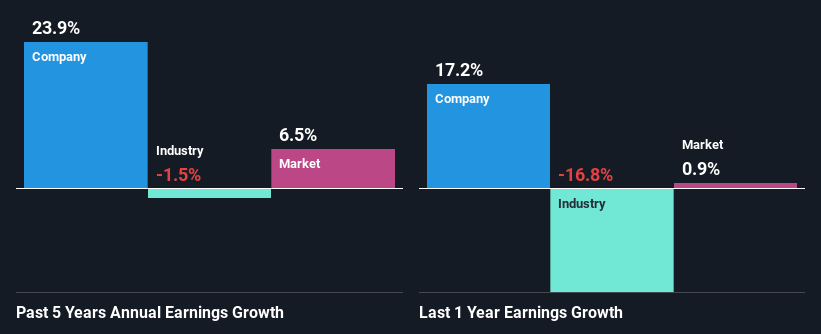
Poly Property Services' (HKG:6049) stock is up by a considerable 17% over the past month. Given that the market rewards strong financials in the long-term, we wonder if that is the case in this instance. Particularly, we will be paying attention to Poly Property Services' ROE today.
Return on equity or ROE is an important factor to be considered by a shareholder because it tells them how effectively their capital is being reinvested. In short, ROE shows the profit each dollar generates with respect to its shareholder investments.
View our latest analysis for Poly Property Services
How Do You Calculate Return On Equity?
The formula for ROE is:
Return on Equity = Net Profit (from continuing operations) ÷ Shareholders' Equity
So, based on the above formula, the ROE for Poly Property Services is:
16% = CN¥1.5b ÷ CN¥9.2b (Based on the trailing twelve months to June 2024).
The 'return' is the yearly profit. Another way to think of that is that for every HK$1 worth of equity, the company was able to earn HK$0.16 in profit.
What Is The Relationship Between ROE And Earnings Growth?
We have already established that ROE serves as an efficient profit-generating gauge for a company's future earnings. Depending on how much of these profits the company reinvests or "retains", and how effectively it does so, we are then able to assess a company’s earnings growth potential. Assuming all else is equal, companies that have both a higher return on equity and higher profit retention are usually the ones that have a higher growth rate when compared to companies that don't have the same features.
A Side By Side comparison of Poly Property Services' Earnings Growth And 16% ROE
To begin with, Poly Property Services seems to have a respectable ROE. On comparing with the average industry ROE of 5.2% the company's ROE looks pretty remarkable. Probably as a result of this, Poly Property Services was able to see an impressive net income growth of 24% over the last five years. We reckon that there could also be other factors at play here. For instance, the company has a low payout ratio or is being managed efficiently.
When you consider the fact that the industry earnings have shrunk at a rate of 1.5% in the same 5-year period, the company's net income growth is pretty remarkable.

Earnings growth is an important metric to consider when valuing a stock. It’s important for an investor to know whether the market has priced in the company's expected earnings growth (or decline). Doing so will help them establish if the stock's future looks promising or ominous. Has the market priced in the future outlook for 6049? You can find out in our latest intrinsic value infographic research report.
Is Poly Property Services Efficiently Re-investing Its Profits?
Poly Property Services has a really low three-year median payout ratio of 24%, meaning that it has the remaining 76% left over to reinvest into its business. So it looks like Poly Property Services is reinvesting profits heavily to grow its business, which shows in its earnings growth.
Additionally, Poly Property Services has paid dividends over a period of five years which means that the company is pretty serious about sharing its profits with shareholders. Our latest analyst data shows that the future payout ratio of the company is expected to rise to 41% over the next three years. Regardless, the ROE is not expected to change much for the company despite the higher expected payout ratio.
Conclusion
Overall, we are quite pleased with Poly Property Services' performance. Particularly, we like that the company is reinvesting heavily into its business, and at a high rate of return. Unsurprisingly, this has led to an impressive earnings growth. Having said that, the company's earnings growth is expected to slow down, as forecasted in the current analyst estimates. To know more about the company's future earnings growth forecasts take a look at this free report on analyst forecasts for the company to find out more.
Have feedback on this article? Concerned about the content? Get in touch with us directly. Alternatively, email editorial-team (at) simplywallst.com.
This article by Simply Wall St is general in nature. We provide commentary based on historical data and analyst forecasts only using an unbiased methodology and our articles are not intended to be financial advice. It does not constitute a recommendation to buy or sell any stock, and does not take account of your objectives, or your financial situation. We aim to bring you long-term focused analysis driven by fundamental data. Note that our analysis may not factor in the latest price-sensitive company announcements or qualitative material. Simply Wall St has no position in any stocks mentioned.